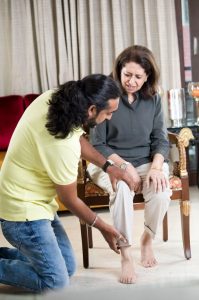How to deal with the difficult behavior of Elders

One of the most common complaints we have with our elderly people is their difficulty in behaviours and reluctance to perform certain things. Bearing this in mind, we should arrange potential elder care services at home to care for elderly people. Many home care centres have sprouted up displaying in-home services to the patients at home, and Anavayaa is one of the best home care centres you can choose for your elderly wellbeing at home .

Let us look at the ways to deal with the difficult behaviours of elderly people at home.
Elderly anger and outbursts
This is a common problem encountered by elderly people. They might behave that way due to the chronic pain they experience from any surgery or
any pain due to their age,
unrest due to the sudden loss of their freedom,
and many other restrictions in their daily routine that are not allowing them to be themselves.
To deal with this issue:
Try to identify the root cause of their anger.
Remember that the elderly people’s primary target is their caregiver or immediate family member.
So, display tremendous patience while communicating with them or reacting to their words.
Abusive behaviours
Elders at home might turn mentally and emotionally abusive due to their frustration with their health conditions. They cannot take that their movements are restricted and lash out often at the people who take utmost care of them. This is even more common among people with NPD (narcissistic personality disorder and borderline personality disorder), who often blame the people who care more for them.
To deal with patients’ abusive behaviours, make sure to assure them that you are not degrading them but providing them with care and empathy that is essential for them at the moment.
Poor hygiene of the elders
Elders might be reluctant to bathe and clean themselves and avoid their family members helping them bathe to keep them clean. We can find these behaviours, especially in dementia and people with depression and other mental disorders. People with dementia might get scared to bathe, while people with depression do not find any interest in hygiene altogether.
To take care of the patients who do not want to be clean, communicate with them in an assuring tone. If they are scared to take a bath, arrange grab bars, chair showers etc., that help them feel safe and secure.
Paranoia, Delusions and Hallucinations
Paranoia, delusions, and hallucinations take different forms among different people. When elders experience any of them, they can abuse people or theft, witness people, not there and feel like someone is trying to harm them.
In cases like these, try to assure the patients by listening to what they are saying even if it’s delusional, as trying to get them out of the situation is fruitless. The patients with paranoia and dementia are going through, is an absolute reality for them. Agreeing to what they are saying and giving a safe vibe is an excellent coping technique you can follow.
Reluctance to accept home caregivers.
Home caregivers are the best option a family member can choose if they cannot provide their elderly services 24/7. Some elderly people will prefer only family members taking care of them instead of accepting any outside nursing care. They can even turn aggressive if you appoint a home care nurse without their permission.
A home care attendant might make the elders feel that their immediate family members are unwilling to them. To deal with this situation, sit with them and explain why you have decided to appoint a caregiver and how the caregiver provided extensive and meticulous care compared to the family members.
If their embarrassment and resentment multiplied with the presence of a caregiver, ask the caregiver to meet the patient informally first before joining. This helps in developing rapport with the elders and reduces their embarrassment. Professional caregivers can deal with these situations effectively, so you do not have to worry much about that.

Attention seeking behaviour
Elderly people when they fall sick or when they start to age demand extensive attention and 24/7 presence of their caregivers right by their side. Some elders will also find it unacceptable if the caregiver has other plans and is busy with their family and personal lives. This is so suffocating for the family member as the other things to work out in their lives.
In a situation like this, please discuss with your elders the activities that interest them the most and join them in various clubs like book clubs, and recreation clubs. And clubs that include elderly people’s recreation activities. If the elderly people cannot move due to any surgery, spend some fixed time with them. And make them join online clubs and groups to keep them engaged. This makes them feel refreshed and does not intrude into your life much.
Conclusion
Elderly care is a long term and sometimes a lifelong responsibility of the family member. Implying that a family member should understand every meticulous behaviour of the elderly people and take care of it properly in every way possible. With Anvayaa, you can assure your elders of the best elder care and patient care services in Mumbai.



